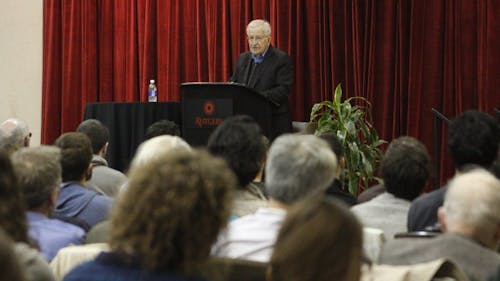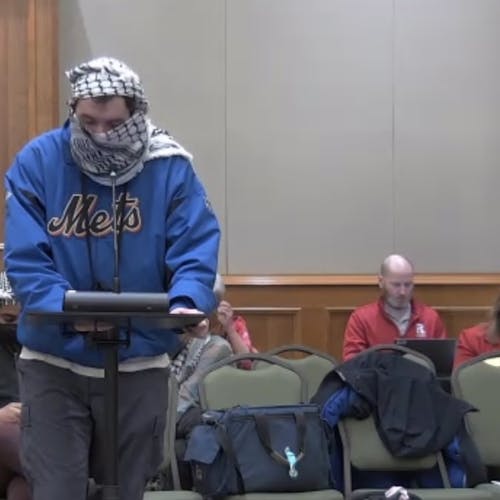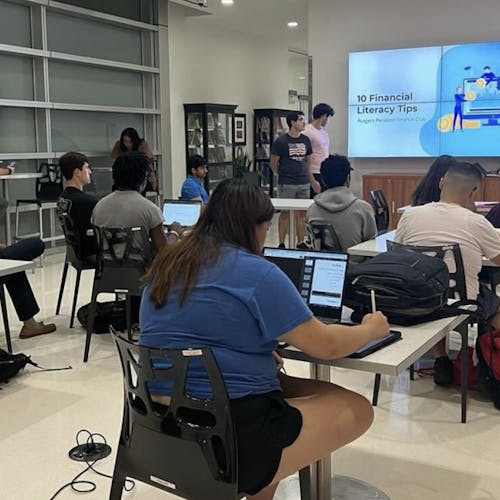Famed academic Noam Chomsky visits Rutgers

There was a recent international poll conducted by Gallup, a leading poll organization, in which one of the questions asked was which country is a leading threat to world peace.
“The United States wins by a huge margin,” Noam Chomsky said.
The American linguist, philosopher, cognitive scientist, logician, political commentator, social justice activist and anarcho-syndicalist advocate, said the results of the poll were not reported in the U.S. because they conflict radically with the country’s picture of itself.
“It’s fair to say that there is nothing at all exceptional about American exceptionalism,” he said. “It mirrors the pronouncement of intellectuals of England ... and France and others in their day in the sun.”
A line of people within all ages ran outside of Trayes Hall on Friday night starting at 7 p.m., one hour before Noam Chomsky gave a lecture, “American Exceptionalism: Some Current Case Studies.”
James Masschaele, executive vice dean of the School of Arts and Sciences, said it is often said that when someone of Chomsky’s stature comes to talk, he’s a speaker who needs no introduction, and that is certainly true.
He did not want to try and summarize Chomsky’s accomplishments, but did mention Chomsky published more than 100 books, is a member of the American Academy of Arts and Sciences and The National Academy of Sciences, and received honorary degrees and honorary doctorates from some 39 institutions spread all across the globe.
The breadth of his influence is vast and most notable, Masschaele said.
A book will soon appear, Chomsky said as he opened into his lecture, by two influential figures which informs how the U.S. is an exceptional nation, which has guaranteed freedom, security and peace for a large share of humanity than any other nation in all of history. There is no other nation like it, and there never has been, he quoted from the book.
“It’s true that this statement might be discounted, the senior author, Dick Cheney, has prime responsibility for the greatest crime of the current century, the invasion of Iraq,” he said.
Chomsky said the invasion distinctively left hundreds of thousands of corpses and millions of refugees and virtually destroyed the country.
It also ignited a sectarian conflict, which now is tearing the entire region to shreds. But, he said, it would be wrong to discount Cheney's statement because it is actually conventional, pretty much across the spectrum.
Chomsky went on to list a few case studies to illustrate the importance and then disadvantages of the U.S.'s integrity in the international arena.
“Just to take an example, virtually at random ... (social scientist) Samuel Huntington writes in a prestigious journal at Harvard University that the national identity of the United States, unlike other powers, is defined by a set of universal, political and economic values, namely, liberty, democracy, equality, private property and markets, hence the United States has a solemn duty to maintain its international primacy for the benefit of the world,” he said.
Chomsky then leaned toward the leading left liberal intellectual journal, the New York Review.
“The former chair of the Carnegie Endowment for International Peace instructs us that American contributions to international global economic growth, freedom and human well being have been so self-evidently unique and have been so clearly directed to others' benefit that Americans have long believed that the United States amounts to a different kind of country,” he said.
Where other nations push toward their national interest, the U.S. tries to advance universal principles, Chomsky said.
It is fair to say that, in general, the contributors adhere to the analysis of America’s purpose, which was made by one of the founders and icons of hard-headed unsentimental, realist doctrine, Hans Morgenthau, in his book, "The Purpose of American Politics," Chomsky said.
The book, published in 1960, explains that the U.S. is unlike other powers, past and present, because it has a “transcendent purpose, the formation of equality, freedom in American as well as freedom throughout the world," Chomsky said.
Morgenthau was an honest and competent scholar, according to Chomsky, who recognized that the historical record is “radically inconsistent” with the transcendent purpose, Chomsky said. But Morgenthau explains that people should not be mislead by what appears to be an obvious contradiction.
In Morgenthau’s words, Chomsky said people should not confound the abusive reality with reality itself.
“Reality itself is the unachieved national purpose revealed by the evidence of history as our minds reflect it. That’s reality,” Chomsky said. “The actual historical record is merely the abuse of reality.”



